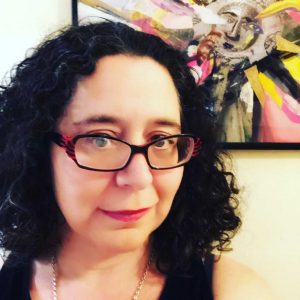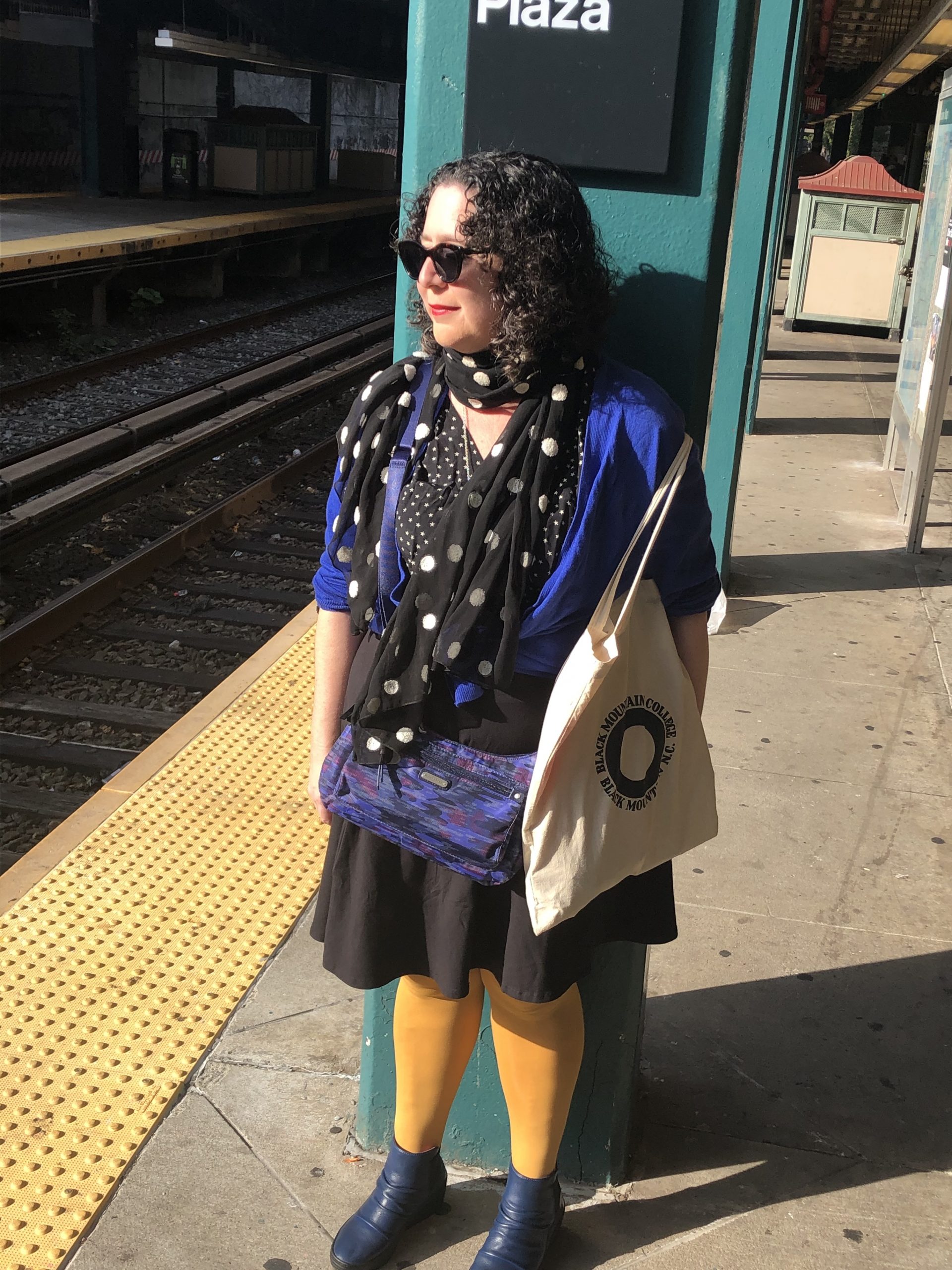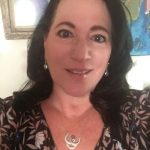 by Liz Axelrod
by Liz Axelrod
When I was in Grad School, Elaine Equi assigned Joanna Fuhrman’s Pageant to our class. I was struck then by how timely, topical, fun, and important her work was. Then came The Year of Yellow Butterflies with it’s fabulous blog where Fuhrman reached out to fellow poets to create their own version of “It was the year we discovered.” Now at the tail end (hopefully) of the pandemic, Joanna Fuhrman has released To A New Era, with poems birthed during some of the most trying times for those of us who still love Democracy. These poems speak of protest, of opening the window on disturbing human nature, of activism, and of hope for the future. They shine brilliant-hued beams through the cracks of our isolation. I wish we could have sat down in person to do this interview, but thankfully we were able to meet each other through email.
Boog City: You published To A New Era during the pandemic. It seems so timely and prescient. Some of these poems came directly out of the pandemic and some from that equally unstable time pre-pandemic. How has our current climate changed the way you look at the world as a writer?
Joanna Fuhrman: A lot of this book—written mainly during the Trump era—is my reckoning with my own naivete. Like a lot of white people, I was in total shock that Trump could say such horrible racist and sexist things and then go on to win the presidency. I just thought our country was better than that, and I was writing poems to figure out how—even though intellectually I knew the legacy of slavery is at the heart of American History—I was so blindsided.
I’m not sure that exactly answers the question. Do I look at the world “as a writer?” I’m a poet who looks at a funhouse version of the world. I don’t write a poetry of witness. I had a poem in the early draft of the book called “The Bad Witness.” As a writer, I am usually more interested in questions and transformations than in reportage. The world weasels itself into these poems, but the poems are always about and not about the world. My readers probably know neo-liberalism stinks, they don’t need my poetry to teach them about it.
Back in our pre-covid reality, we were worried about freedom, women’s rights, and the idea that Fascism might overtake the world—I’m not sure this has gone away. Your poem, “Benediction for a New Year” speaks of this and reflects on anger and “letting my anger disappear.” Do you believe we are headed to a place where that is possible?
I think the absurd evil of the Trump administration has faded, but the structural problems of our economy and culture are still in place, so not really. But personally, I don’t like being angry all of the time or most of the time. I think it’s fine to make a decision to not to feel angry. You don’t need to feel anger to act.
Anne Frank wrote “I can shake off everything as I write, my sorrows disappear, my courage is reborn.” I thought of this when I read your poem “Justin Bieber Visits The Anne Frank House.” I’ve been thinking of how we as writers have the ability and perhaps the responsibility to make sense of our time here on earth in order to illustrate, encourage, and teach. Do you agree?
Sure. I think many writers feel this way, but personally I don’t like the feeling of being lectured to when I am reading. I think if we write to figure out the world for ourselves, we might also teach someone something else, but I don’t think what makes poetry special is “illustration.” I tend to be more interested in non-mimetic uses of language. For me the questions always are, how might a poem embody a struggle, rather than illustrate it?
If within a poem you could inspire a person to change a mindset, release a fear, or just let go of something weighing them down, what individual would you most want to inspire to change?
I am a teacher, so when I think about someone learning something I think about my students. I think I would like them to realize that not everything has to be successful, that there’s no shame in failure. I want them to be freer to take risks. Yesterday someone asked on Facebook, “Describe your job badly,” and I wrote, “I try to teach people to make less sense.” My students often say that the main thing they learn from my class is to be comfortable with enjoying poetry without always understanding it.
Poems like “We Were on Our Way to the Protest March or Brunch,” and “A Short Essay on Protest” speak to the time we live in and the change we hoped to see that just hasn’t happened yet. Protest is such a vital part of our democracy and as poets I believe we must do everything we can to create that change. But it’s getting harder and harder to fight. Do you agree? What advice would you give to a young poet on this responsibility?
I really don’t think poets have a special responsibility. I think everyone has a responsivity to be a good citizen, and sometimes that means voting and sometimes that means canvassing or postcarding or phone banking and sometimes that means protesting, but I don’t think writing a poem about changing the world changes anything. I think that we all have to be kind to ourselves and figure out a way to balance everything we have to do all the time, and it’s not easy for anyone. Poetry is a pretty marginal art, at least in this country, so I just think if you want to change the world, there are better ways to do it. But that said, as a person, you should care about the world, so it’s natural for that to be reflected in your art.
You write about life in NYC and Brooklyn and your fondness for city life and the incongruities and abnormalities therein makes poems like “The B Train,” “Song of Flatbush,” and “Lines from A Brooklyn Fortune Cookie” resonate with a sort of inside joke that city living is hard but there’s no other place to be. Could you live outside of the city and if so where?
I like cities—especially cities where one can walk around and observe people. I feel lucky that I’ve been able to survive in NY, but I think if I had to I could find things to love about other places, too. I think about O’Hara: “I can’t even enjoy a blade of grass unless I know there’s a subway handy, or a record store or some other sign that people do not totally regret life.” But you know, there are other places to watch people. It takes me over two hours each way to get to Rutgers where I teach, so I think about moving sometimes. It might be nice to have room for more bookcases too.

My thoughts about the pandemic have often brought me back to 9/11. You write about the “post covid future” – In thinking about the post 9/11 future and what we went through during that time, what are your hopes for New York and the world once we move from this current time of solitude and singularity?
I hope NYC elects Diana Morales or Maya Wiley, and that we start to build this city back so it’s not only for the rich. I’m not sure if I’m hopeful or not. So far, Biden has been a much better president than I imagined was possible. Is that hope? I guess so. The larger problems with our democracy not being representative of most voters is going to be very difficult to change, so I guess I choose to have some hope, but I think I’m realistic about what an uphill battle it is.
I was struck by your poem “Muriel Said That to Be a Jew in the 20th Century Is to be Offered a Gift.” The lines are so rich with detail and feeling and so relevant for where we are today. Lines like “The bill of rights written on your ass in black eyeliner so the enemies you moon will finally understand the uses of free speech. Click, pause, reset.” And further in the poem “This is what we thought democracy looked like: reading poetry in the sandbox, the ocean removing its rubber mask, revealing tongue shaped retractable blades.” The poem, to me, speaks of freedom found and freedom lost and the travesty of the four years preceding this one. Were there specific incidents that inspired the poem or a specific moment that it came into being?
I always have lines of other people’s poetry in my head. This poem started with the middle section of Rukeyser’s “Letters from the Front” tumbling through my mind. “To be a Jew in the twentieth century/ Is to be offered a gift. If you refuse,/ Wishing to be invisible, you choose/ Death of the spirit, the stone insanity./ Accepting, take full life.”
Right before I started the poem, I was in northern Wisconsin visiting my Trump-supporting father-in-law when the Unite the Right in Charlottesville took place. I grew up in Riverdale in the Bronx where the ladies who gave me free cookies all had numbers tattooed on their arm, so from a very early age (like four) I had a sense of the horror of the Holocaust and how that was connected to my identity as a Jew. But I also tended to see at least the kind of Jews I knew as very assimilated. I tended to see contemporary Jewish life as mainly one of privilege, so it was shocking to me to hear the men in khakis chanting that “Jews will not replace us.” I knew intellectually that Jews would eventually be a target once the racists got power, but emotionally I didn’t really believe it until that moment.
Also, I should say some of the lines came out of a procedure where I was putting sentences about memories into search engines and then trying to incorporate some of the found language into lines of poems. I can’t remember what I did exactly, but I remember I was planning a workshop for Brooklyn Poets called Tricks of Inspiration, so I was testing out different procedural ideas. I remember the lines about the cold feet and the teary cloth swan came out of that. And then, once I had some lines I liked, I connected them to the Rukeyser. The section I was quoting was a sonnet, which gave me the idea of writing a half-crown of sonnets. My friend Yerra Sugarman wrote a half-crown I really admired so it inspired me to try the form. Also, Sherman Alexie wrote a bunch of prose poems he called sonnets that were 14 sentences instead of 14 lines, so I thought that was interesting and wanted to include a prose “sonnet” in my half-crown.
Much of your work is full of humor and hope; and plays with current trends. If you were to create a character as a TikTok star my image of that character from your poems would be someone dancing with a Tootsie Pop in a frayed Cookie Monster Costume. What music would you pick to dance to and what would your message to the TikTok community be?
“Release the animal!!”
This is my favorite dancing song:
https://www.youtube.com/watch?v=Z6AY6Vj8x_A
Many of the poems in this book use specific poetry forms like Sestinas, Pantoums, Abecedarians, Centos, and Sonnets. Do you find teaching (and writing) to form influences and inspires the writing process? And is there anywhere we as students can join you to learn about these processes? Are you teaching any workshops over the summer? Are there videos available?
I have my intro to creative writing students write pantoums and sestinas every semester, so those are always on my mind. I also often have my poetry students write in other types of forms, including centos. For me, centos are what I write when I feel stuck and want to get back into writing. I tend to “write” them all the time, but try not to put too many in any one book.
At the end of July, I’m teaching a one-weekend workshop through Brooklyn Poets. I like this short format because on Saturday we start 3 or 4 poems based on collaborative and procedural surrealist-inspired prompts, and then the next day they finish one and we workshop it. I like the intensity of working on things two days in a row.
And finally, if you could meet one of your heroes, sit down and have a conversation, then write a poem about it who would that be and can you think of a good title for that poem?
This is so hard. I feel like I’m friends with a couple of my poetry heroes already, but usually meeting one’s heroes is disappointing. I’m going to say the feminist artist Mary Beth Edelson, because I have a poem for her in my book and a picture of an image by her right over my desk. The title would be “The Great Goddess Shops for Bargains on Clogs.”
Click to read Jean-Paul Pecqueur’s review of Joanna Fuhrman’s To a New Era.
 LIZ AXELROD received her M.F.A. from The New School in 2013. Her work has been published in Yes Poetry, The Rumpus, The Brooklyn Rail, Electric Literature, The Ampersand Review, Maintenent 14, 12th Street Journal, Dancing Girl Press’ Wicked Alice, Counterpunch.com, LunaLunaMagazine.com, and more. Her chapbook, Go Ask Alice was a finalist in the Finishing Line Press New Women’s Voices Competition. Axelrod has written book reviews for Boog City, Kirkus Reviews, and Publisher’s Weekly. She was founder, co-host, and curator of the Cedarmere Reading Series in the home of William Cullen Bryant (2014-2017), and is currently an adjunct English instructor at SUNY Westchester Community College, Central New Mexico Community College, and The University of New Mexico.
LIZ AXELROD received her M.F.A. from The New School in 2013. Her work has been published in Yes Poetry, The Rumpus, The Brooklyn Rail, Electric Literature, The Ampersand Review, Maintenent 14, 12th Street Journal, Dancing Girl Press’ Wicked Alice, Counterpunch.com, LunaLunaMagazine.com, and more. Her chapbook, Go Ask Alice was a finalist in the Finishing Line Press New Women’s Voices Competition. Axelrod has written book reviews for Boog City, Kirkus Reviews, and Publisher’s Weekly. She was founder, co-host, and curator of the Cedarmere Reading Series in the home of William Cullen Bryant (2014-2017), and is currently an adjunct English instructor at SUNY Westchester Community College, Central New Mexico Community College, and The University of New Mexico.
JOANNA FUHRMAN is the author of six books of poetry, including To a New Era (Hanging Loose Press), The Year of Yellow Butterflies (Hanging Loose Press), and Pageant (Alice James Books). She is a former poetry editor for Ping Pong and Boog City and served as the Monday-night coordinator for the poetry readings at The Poetry Project from 2001 to 2003 and the Wednesday-night coordinator from 2010 to 2011. She currently teaches poetry writing at Rutgers University and coordinates the Introduction to Creative Writing Classes.

